Bangor University
Welsh: Prifysgol Bangor | |||||||||||||
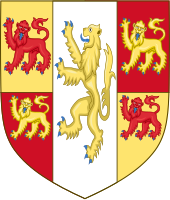 | |||||||||||||
Other name | Welsh: Y Coleg ar y Bryn ("The College on the Hill") | ||||||||||||
|---|---|---|---|---|---|---|---|---|---|---|---|---|---|
Former names | University College of North Wales (1884–1996) University of Wales, Bangor (1996–2007) | ||||||||||||
| Motto | Welsh: Gorau Dawn Deall | ||||||||||||
Motto in English | "The Best Gift is Knowledge" | ||||||||||||
| Type | Public | ||||||||||||
| Established | 1884 | ||||||||||||
| Chancellor | Professor Sir Robin Williams | ||||||||||||
| Vice-Chancellor | Professor Edmund Burke | ||||||||||||
| Students | 10,825 (2022/23)[1] | ||||||||||||
| Undergraduates | 6,475 (2022/23)[1] | ||||||||||||
| Postgraduates | 4,350 (2022/23)[1] | ||||||||||||
| Location | , Wales 53°13′44″N 4°07′48″W / 53.2289°N 4.1301°W | ||||||||||||
| Campus | Bangor | ||||||||||||
| Colours | |||||||||||||
| Affiliations | EUA Universities UK University of Wales ACU HEA EIBFS | ||||||||||||
| Website | bangor | ||||||||||||
 | |||||||||||||
Bangor University (Welsh: Prifysgol Bangor) is a public research university in Bangor, Gwynedd, Wales. It received its Royal Charter in 1885 and was one of the founding institutions of the federal University of Wales.
Formerly known as the University College of North Wales (UCNW; Welsh: Coleg Prifysgol Gogledd Cymru), and later the University of Wales, Bangor (UWB; Welsh: Prifysgol Cymru, Bangor), it adopted its current name in 2007, as it became independent from the University of Wales.
It has over 9,000 students across 3 academic colleges and 11 schools. Its campus makes up a large part of Bangor, and extends to nearby Menai Bridge as well. It has a second campus in Wrexham, primarily for healthcare courses.
History
[edit]Early years
[edit]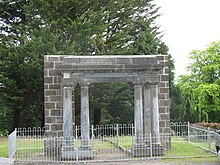
The university was founded as the University College of North Wales (UCNW) on 18 October 1884, with an inaugural address by the Earl of Powis, the college's first President, in Penrhyn Hall.[2] There was then a procession to the college including 3,000 quarrymen, as quarrymen from Penrhyn Quarry and other quarries had subscribed more than 1,200 pounds to the university.[3] The foundation was the result of a campaign for better provision of higher education in Wales that had involved some rivalry among towns in North Wales over which was to be the location of the new college.
Originally based in a former coaching inn, the college was incorporated by Royal Charter in 1885.[2] It opened with just 58 students, who would receive degrees from the University of London until 1893 when UCNW became a founding constituent institution of the federal University of Wales.[4] In that year there was a dispute that led to the closure of the Women's Hall and Frances Hughes who was in the eye of the storm to leave the college.[5]
In 1903, the city of Bangor donated a 10-acre site at Penrallt for a new college building, and with funds raised by local people. The new building, now known as the Main Arts Building, was opened in 1911.[6]
During the Second World War paintings from national art galleries were stored in the Prichard-Jones Hall at UCNW to protect them from enemy bombing. They were later moved to slate mines at Blaenau Ffestiniog.[2] Students from University College London were evacuated to continue their studies in a safer environment at Bangor.[2]
Post-war
[edit]During the 1960s, the university shared in the general expansion of higher education in the UK following the Robbins Report, with many new departments and new buildings.[2] On 22 November 1965, during construction of an extension to the Department of Electronic Engineering in Dean Street, a crane collapsed on the building. The three-ton counterweight hit the second-floor lecture theatre in the original building about thirty minutes before it would have been occupied by about 80 first-year students. The counterweight went through to the ground floor.[7]
In 1967, the Bangor Normal College, now part of the university, was the venue for lectures on Transcendental Meditation by the Maharishi Mahesh Yogi at which The Beatles heard of the death of their manager, Brian Epstein.[8]
Student protests at UCNW in the 1970s focused mainly on calls to expand the role of the Welsh language. Radical students would disturb lectures held in English and paint slogans in Welsh on the walls of the Main Building, resulting some suspensions of these activists. In the early 1980s, the Thatcher government even considered closing down the institution.[2][9] Around this time consideration began of mergers with two colleges of education in Bangor: St Mary's College, a college for women studying to become schoolteachers, and the larger and older Normal College. The merger of St Mary's into UCNW was concluded in 1977, but the merger with Normal College fell through in the 1970s and was not completed until 1996.
Name change
[edit]The 2007 change of name to Bangor University, or Prifysgol Bangor in Welsh, was instigated by the university following the decision of the University of Wales to change from a federal university to a confederal non-membership organisation, and the granting of degree-awarding powers to Bangor University itself. As a result, every student starting after 2009 gained a degree from Bangor University, while any student who started before 2009 had the option to have either Bangor University or University of Wales Bangor on their degree certificate.[10]
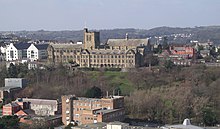
Expansion and financial issues
[edit]Under John Hughes' leadership as Vice-Chancellor from 2010–18, there were several new developments including the opening of St Mary's Student Village,[11] and the first-ever collaboration between Wales and China to establish a new college, which involved Bangor University and the Central South University of Forestry and Technology (CSUFT).[12]
In 2014, the university secured a £45m loan from the European Investment Bank,[13][14] to assist the university in developing its estates strategy. In 2016, the university opened Marine Centre Wales,[15] a £5.5m building on the site of the university's Ocean Sciences campus in Menai Bridge, which was financed as part of the £25 million SEACAMS project, partly funded through the European Regional Development Fund (ERDF).[16]
In May 2017, Bangor became the fourth Welsh university to review its cost base to make savings of £8.5m.[17] The university responded and introduced several cost-saving measures including a reorganisation of the structure of Colleges and Schools and the introduction of a voluntary severance scheme, and several compulsory redundancies was reduced from the initial estimate of 170.[18][19] In addressing its financial challenges, Bangor University also reorganised some subject areas in 2017, which involved introducing new ways of coordinating and delivering adult education and part-time degree programmes,[20] continuing to teach archaeology, but discontinuing the single honours course,[21] and working with Grwp Llandrillo Menai to validate the BA Fine Arts degree.[22][23]
Other issues which attracted adverse media comment included the cost overrun and delayed opening of the Pontio Arts and Innovation Centre in 2016,[24] the appointment of Hughes's then wife to a newly created senior management position,[25] the purchase and refurbishment of a house for the vice-chancellor by the university for £750,000,[26] the expenses of some senior staff,[27][28] and the discrepancy between senior management salaries and remuneration for staff working on zero hour contracts.[29][30]
The university announced Hughes' early resignation in December 2018, after allegations of harassment were made against him by his ex-wife and student protests against staff cuts and the closure of the chemistry department.[31][32]
In June 2019, the university launched a consultation to concentrate its non-residential estate onto a single campus in Bangor (Deiniol Road and College Road sites) and dispose of some major sites (including Normal Site, Dean Street and Fron Heulog), 25 per cent of the estate.[33][34]
February 2020 saw a 14-day strike from staff in response to pay and working conditions.[35] In September 2020, the university announced a new round of cuts to fill a £13m gap in the budget, saying 200 more jobs (including 80 academic posts) were at risk.[36] Another reorganisation of the university's structure of Colleges and Schools was announced as well. Staff passed a motion of no confidence in the university management.[37]
Medical School established
[edit]In 2021 the Welsh Government announced plans to expand medical teaching at the university in collaboration with Cardiff University School of Medicine, to establish an independent medical school in North Wales following several years of delivering the franchised C21 North Wales for Cardiff.[38] The independent North Wales Medical School will admit its first intake in September 2024.
Campus and buildings
[edit]The University occupies substantial buildings in and around Bangor, whilst its School of Health Sciences and the North Wales Medical School also operate facilities at the University's Cambria campus within Wrexham Technology Park.
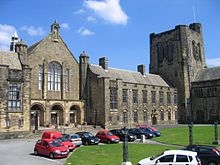
The university was originally based in an old coaching inn, the Penrhyn Arms Hotel, which housed its 58 students and its 12 teaching staff. In 1911 it moved to a much larger new building, which is now the old part of the Main Arts Building. This building, designed by Henry Hare, had its foundation stone laid by King Edward VII on 9 July 1907 and was formally opened by King George V in 1911. The iconic building, which occupies a highly visible position overlooking Bangor, gave the college its Welsh nickname Y Coleg ar y Bryn ("The College on the Hill"). It included the large Prichard-Jones Hall, named after Sir John Prichard-Jones a local man who became a partner in the London department store Dickins & Jones and was a substantial benefactor of the building.[2] The building became a Grade I-listed building in 1949.[39]
A modern extension, completing a quadrangle on the College Road side of the building, was completed in 1969. This is now known as the Main Arts Building.
Pontio
[edit]The university's arts and innovation centre Pontio opened in 2016. The building includes teaching and social spaces and houses the offices of the students' union.
Organisation
[edit]Colleges and schools
[edit]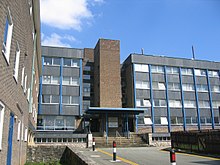
The academic activities of Bangor University are organised into three colleges:[40]
| College of Arts, Humanities and Social Sciences[41] | College of Science and Engineering[42] | College of Medicine and Health[43] |
|---|---|---|
|
|
|
Governance
[edit]Governance of Bangor University is set out by its charter. It is ultimately governed by a council, which oversees the university's strategic direction, financial health, and policy compliance.[44] Its senate manages all academic matters, such as teaching and research standards. The executive, led by the vice-chancellor, handles the day-to-day administration and implementation of strategic decisions. [45]
The current vice-chancellor is Professor Edmund Burke. He is supported by a deputy vice-chancellor and four pro-vice-chancellors.[45]
Various committees support these bodies in specialized areas, and students are actively involved in governance through representation on key committees. The university is also accountable to external bodies like the Higher Education Funding Council for Wales.
Academic profile
[edit]Research
[edit]The university's research expertise in the areas of materials science and predictive modelling was enhanced in 2017 through a collaboration with Imperial College London and the formation of the Nuclear Futures Institute at Bangor with the award of £6.5m in funding under the Welsh Government's Ser Cymru programme.
The university-owned £20m Science Park on Anglesey, M-Sparc was completed in March 2018, which will support the development of the region's low-carbon energy sector.
Rankings
[edit]| National rankings | |
|---|---|
| Complete (2025)[46] | 68 |
| Guardian (2025)[47] | 73 |
| Times / Sunday Times (2025)[48] | 64 |
| Global rankings | |
| ARWU (2024)[49] | 601–700 |
| QS (2025)[50] | 474= |
| THE (2025)[51] | 401–500 |
The 2014 Research Excellence Framework recognised that more than three-quarters of Bangor's research is either world-leading or internationally excellent. Based on the university submission of 14 Units of Assessment, 77% of the research was rated in the top two tiers of research quality, ahead of the average for all UK universities.[52]
In 2017, Bangor University became the only university in Wales to be rated 'Gold' by the new Teaching Excellence Framework (TEF) which means that the university is deemed to be of the highest quality found in the UK, providing "consistently outstanding teaching, learning and outcomes for its students."[53][54]
In recent years, Bangor has been rated highly by its students in two independent surveys of student opinion. In the National Student Survey, the university has been consistently ranked highly both within Wales and in the UK higher education sector.[55] In 2017, Bangor University's students placed the university eighth among the UK's non-specialist universities and second among Welsh Universities.[56][third-party source needed]
For the second year in a row, Bangor was awarded Best University in the UK for Clubs and Societies at the 2018 WhatUni Student Choice Awards. It also regained the award for best Student Accommodation which it originally won in 2016. The university was also placed second overall for 'Courses and Lecturers' and retained third place in the category 'University of the Year'. WhatUni award nominations are based on the reviews and opinions of the university's students. This is the fourth year in a row that Bangor University has won a national WhatUni Award.[57][58][third-party source needed]
Student life
[edit]Halls of residence
[edit]University Hall, built in red brick a Queen Anne style, was the first substantial block. It was opened in 1897.[59] This building was to become the Welsh-language hall Neuadd John Morris-Jones in 1974, taking its name in honour of Professor John Morris Jones.[2] It is now called Neuadd Rathbone.
Neuadd Reichel, built on the Ffriddoedd Farm site, was designed in a neo-Georgian style by the architect Percy Thomas and was opened in 1942 as a hostel for male students.[2][59]
Expansion in the 1960s led to the development of Plas Gwyn in 1963–64 and Neuadd Emrys Evans in 1965, both on the Ffriddoedd site, and Neuadd Rathbone at the top of Love Lane in 1965.[2] Neuadd Rathbone, designed by Colwyn Foulkes and named after the second President of the college, was originally for women students only.[59] The names of Neuadd Rathbone and Neuadd John Morris-Jones were later exchanged. The building originally opened as Neuadd Rathbone is now known as Neuadd Garth.
Accommodation is guaranteed for all first-year undergraduate students. There are around 3,000 rooms available in halls of residence, all within walking distance of the university. There are three residential sites in current use: Ffriddoedd Village, St Mary's Village and Neuadd Garth.
Ffriddoedd Village
[edit]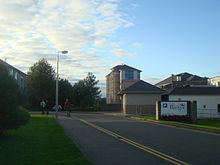
The largest accommodation site is the Ffriddoedd Village in Upper Bangor, about ten minutes' walk from Top College, the Science Site and the city centre. This site has eleven en-suite halls completed in 2009, six other en-suite halls built in the 1990s and Neuadd Reichel built in the 1940s, and renovated in 2011.
Two of the en-suite halls, Bryn Dinas and Tegfan, now incorporate the new Neuadd John Morris-Jones, which started its life in 1974 on College Road and has, along with its equivalent Neuadd Pantycelyn in Aberystwyth, became a focal point of Welsh-language activities at the university. It is an integral part of UMCB, the Welsh Students' Union, which in turn is part of the main Students' Union.
The halls on "Ffridd" (ffridd [friːð] is the Welsh word for mountain pasture or sheep path; ffriddoedd [ˈfrɪðɔið] is its plural form) include Cefn y Coed, Glyder, Y Borth, Elidir, J.M.J. Bryn Dinas and J.M.J. Tegfan, all of which were built in the early 1990s; Adda, Alaw, Braint, Crafnant, Enlli, Peris, Glaslyn, Llanddwyn, Ffraw, Idwal and Gwynant, which were all built in the late 2000s; and Neuadd Reichel which was built in the 1940s and renovated in 2011. From 2021, Neuadd Reichel will no longer be used for student accommodation.
St Mary's Village
[edit]Bryn Eithin overlooks the centre of Bangor and is close to the Science Departments and the Schools of Computer Science and Electronic Engineering. Demolition of the former St Mary's Site halls, except the 1902 buildings and the Quadrangle, began in 2014 to make way for new halls which were completed in 2015. The halls on this site are Cybi, Penmon, and Cemlyn, which are all self-catered flats; Tudno, which is a townhouse complex; and the original St. Mary's building, with studios and flats.[60]
In Welsh, bryn means "hill" and eithin means "gorse".
Private halls
[edit]A private hall of residence called Tŷ Willis House (formerly known as Neuadd Willis) is operated by iQ Student Accommodation; which incorporates the old listed British Hotel with a new extension to the rear, and a further hall on the site of the old Plaza Cinema. Other privately owned halls of residence in Bangor include Neuadd Kyffin, Neuadd y Castell, Neuadd Llys y Deon and Neuadd Tŷ Ni.
Student union
[edit]Undeb Bangor is Bangor University's students' union, providing services, support, and activities for students. All students automatically become members unless they opt-out. Annual elections are held for several sabbatical officers are elected; President, UMCB President, VP for Education, VP for Societies and Volunteering and VP for Sports. These sabbatical officers are accountable for the actions and decisions of the union and often work closely with members of the Student Council and other boards.
In January 2016 the students' union moved to the new Pontio Arts and Innovation Centre.
Student represenation
[edit]The Student Council is a forum that meets monthly in the academic year to discuss, debate, and pass ideas, as well as work alongside the sabbatical officers on projects to improve the student experience.[citation needed]
A course representative is also elected from each programme. In 2022 Undeb Bangor announced the introduction of LGBTQ+ reps into the course rep system, to champion the LGBTQ+ community and represent LGBTQ+ students.[citation needed]
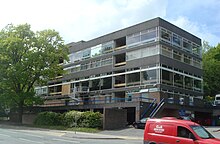
Societies
[edit]There are around 100 student societies which bring like-minded people together. These include course-related societies; societies that celebrate nationalities and cultures and societies for students with specific interests like drama, music, film and photography. Membership of the societies is free.[citation needed]
Media
[edit]Y Seren is the university's official English language student newspaper. The newspaper is published monthly and is based out of the Pontio Arts Centre building.[citation needed]
Storm FM is the official student radio station for Bangor University and is one of only three student radio stations in the UK with a long-term FM licence, which authorises broadcasting to a very small area of Bangor, namely the Ffriddoed Road Halls of Residence. Storm FM went on air in March 2003 and began streaming online in 2009.[61]
Volunteering
[edit]SVB (Student Volunteering Bangor) is the volunteering branch of the students' union, which has supported community projects in and around the Bangor area since 1952. SVB volunteers provide a total of around 600 hours of work per week on 58 community-based projects, including projects on mental health, children, the environment, the elderly and community & sports projects. SVB works closely with charities, organisations and schools around Bangor and North Wales, as well as further afield.
In 1952, SVB organised a tea party for local elderly residents. The tea party project continues to this day and is SVB's oldest project.
Bangor Rag is an SVB project that collects money for two local and two national charities, which change every academic year and are chosen by the students. Rag members regularly attend "raids" across the country and assist charities with one-off events throughout the year. Their mascot is a tiger named Rhodri Rag.
Sports and varsity
[edit]Sports at Bangor University are managed by the Athletics Union, a part of Undeb Bangor. Notable sports clubs include Bangor University F.C. and Bangor University Rowing Club.
Every year the university competes against Aberystwyth University in Varsity, a sporting tournament which sees hundreds of students compete in over 40 sporting events for the Varsity Trophy.
Notable people associated with Bangor
[edit]Presidents/Chancellors
[edit]- Edward Herbert, 3rd Earl of Powis, 1884–1891
- William Rathbone 1891–1900
- Lloyd Tyrell-Kenyon, 4th Baron Kenyon 1900–1927
- Herbert Gladstone, 1st Viscount Gladstone 1927–1935
- Lord Howard de Walden 1935–1940
- William Ormsby-Gore, 4th Baron Harlech 1940–1945
- Charles Paget, 6th Marquess of Anglesey 1945–1947
- Lloyd Tyrell-Kenyon, 5th Baron Kenyon 1947–1982
- William Mars-Jones 1982–1995
- Cledwyn Hughes 1995–2000
- Dafydd Elis-Thomas 2000–2017[2]
- George Meyrick 2017–2022[62]
- Professor Sir Robin Williams 2022–present [63]
Vice Chancellors
[edit]The university has had nine Principals/Vice-Chancellors:
- Henry Reichel, Principal 1884–1927
- David Emrys Evans, Principal 1927–1958
- Charles Evans, Principal 1958–1984
- Eric Sunderland, Principal, Vice-Chancellor 1984–1995
- Roy Evans, Vice-Chancellor 1995–2004
- Merfyn Jones, Vice-Chancellor, 2004–2010
- John G. Hughes, Vice-Chancellor 2010–2018[2]
- Graham Upton, Vice-Chancellor 2018–2019
- Iwan Davies, Vice-Chancellor 2019–2022
- Edmund Burke, Vice-Chancellor 2022–present
Notable academics
[edit]- Samuel L. Braunstein, quantum physicist, 1997–2004
- Ronald Brown is an English mathematician known for his work in algebraic topology
- Tony Conran, poet and translator, Reader in English and Tutor until 1983
- David Crystal, linguist and author, honorary professor of Linguistics
- A. H. Dodd, historian, 1919–1958
- Israel Dostrovsky (1918–2010), Ukrainian-born Israeli physical chemist, fifth president of the Weizmann Institute of Science
- John L. Harper, biologist, ecologist, British scholar and scientist, 1925–2009
- Raimund Karl, archaeologist, 2003–2020
- Christian Koller, historian, eighth director of the Swiss Social Archives, 2007–2014
- Bedwyr Lewis Jones, scholar
- William Mathias, composer, former professor of music
- John Morris-Jones, pioneering Welsh grammarian, editor, poet and literary critic
- Guto Puw, Welsh composer
- Duncan Tanner, historian of the Labour Party, 1989–2010
- John Meurig Thomas, Department of Chemistry
- Gwyn Thomas, Welsh scholar and poet
- Margaret Thrall, Welsh theologian and Anglican priest
- Innes McCartney, British scientist
- Stephen Eichhorn is a British materials scientist
Notable alumni
[edit]- Danny Boyle, film director and producer, graduated in English and drama
- Paul Bérenger, former Prime Minister of Mauritius[64]
- Martin J. Ball, emeritus professor of linguistics at Bangor University, Cymru/Wales.
- Frances Barber, actress
- Richard Brunstrom, Chief Constable of North Wales Police[65]
- Gordon Conway, president of the Royal Geographical Society and vice Chancellor of the University of Sussex[66]
- Dominic Chad, guitarist and pianist for Cheshire band Mansun
- Paul Alan Cox, ethnobotanist
- Colin Eaborn, chemist
- Aled Eames, maritime historian and warden of Neuadd Reichel in the 1950s and 1960s
- Robert G. Edwards, physiologist and pioneer in reproductive medicine won the 2010 Nobel Prize in Physiology or Medicine.[67]
- John Evans, film director
- Bill Fay, singer/musician and recording artist
- Raymond Garlick, poet and editor
- Tony Gillam, musician and writer
- Mary Dilys Glynne, plant pathologist
- Gwynn ap Gwilym, poet
- Lowri Gwilym, television and radio producer
- Tim Haines, BBC producer
- Julian Hibberd, a plant scientist, was named by Nature as one of the "Five crop researchers who could change the world"
- Howel Harris Hughes, theologian, Presbyterian minister and Principal of the United Theological College, Aberystwyth.[68]
- Siân James, traditional/folk singer and musician
- Ann Clwyd, Labour MP 1984 - 2019
- Einir Jones, poet
- Kathy Jones, Anglican priest and Dean of Bangor
- Martha Elizabeth Newton, bryologist and cytologist
- John Ogwen, actor
- R. Williams Parry, poet
- Tom Parry Jones, scientist, and developer of the first handheld electronic breathalyser
- Mmusi Maimane, South African politician
- Bethany C. Morrow, author
- Stefan Rahmstorf, professor of Physics of the Oceans at Potsdam University[69]
- Derek Ratcliffe, botanist, zoologist and nature conservationist
- Howard Riley, jazz pianist and composer
- Gareth Roberts, physicist and university administrator
- Kate Roberts, writer
- Andy Rowley, TV Producer
- John Sessions, actor
- Lyndon Smith, Professor in Computer Simulation and Machine Vision, University of the West of England
- Gwyn Thomas, poet and academic, National Poet of Wales
- R. S. Thomas, poet and Anglican priest
- Derick Thomson, Scottish Gaelic poet, publisher, academic and writer
- Tim Wheeler, Vice-Chancellor of the University of Chester
- Roger Whittaker, musician
- Bill Wiggin, Conservative MP for Leominster
- Gareth Williams, Secret Intelligence Service employee
- Ifor Williams, historian and editor of Welsh literature
- Herbert Wilson, a physicist who worked on the structure of DNA
- Hamza Yassin, TV presenter and wildlife cameraman. Zoology with conservation graduate
- Fahad Abdulrahman Badar, Qatari Mountaineer and banker
- Denis Kwok, singer and actor; member of Hong Kong Cantopop group 'Error'
Fictional alumni
[edit]- The title character of Helen Fielding's 1996 novel Bridget Jones's Diary attended Bangor University.
See also
[edit]- Armorial of UK universities
- List of universities in the United Kingdom
- List of universities in Wales
- List of forestry universities and colleges
References
[edit]- ^ a b c "Where do HE students study?". Higher Education Statistics Agency. Retrieved 23 September 2024.
- ^ a b c d e f g h i j k l David Roberts (2009) Bangor University 1884–2009, University of Wales Press ISBN 978-0-7083-2226-0
- ^ The Times, Monday, 20 October 1884; pg. 7; Issue 31269; col F
- ^ "The birth of Bangor's university". 25 September 2009. Retrieved 7 September 2024.
- ^ Oman, Georgia (7 June 2023). Higher Education and the Gendering of Space in England and Wales, 1869-1909. Springer Nature. p. 71. ISBN 978-3-031-29987-2. Archived from the original on 5 October 2024. Retrieved 29 October 2023.
- ^ "University History". Bangor University. Archived from the original on 7 September 2024. Retrieved 7 September 2024.
- ^ The Guardian, 23 November 1965, p. 6.
- ^ "Higher Browsing: The Third Degree". The Guardian. 27 August 2002.
- ^ "Welsh language activist kicked out of Bangor University releases autobiography". The Bangor Aye. 24 November 2020. Archived from the original on 27 November 2021. Retrieved 15 July 2021.
- ^ University, Bangor. "Welcome - Student Administration - Bangor University". bangor.ac.uk. Archived from the original on 6 February 2012. Retrieved 1 June 2007.
- ^ University, Bangor. "St Mary's Village | Bangor University Accommodation". bangor.ac.uk. Archived from the original on 6 April 2019. Retrieved 2 May 2018.
- ^ University, Bangor. "Partners sign agreement for first Wales-China College collaboration – News and Events, Bangor University". bangor.ac.uk. Archived from the original on 6 April 2019. Retrieved 2 May 2018.
- ^ Barry, Sion (2 April 2014). "Bangor University lands a £45m funding boost from the European Investment Bank". Archived from the original on 7 April 2019. Retrieved 25 November 2017.
- ^ "University upgrade wins £45m funding". BBC News. 2 April 2014. Archived from the original on 9 April 2019. Retrieved 21 July 2018.
- ^ Roberts, Joanne (13 July 2016). "Prince Charles opens Bangor University's Marine Centre Wales". northwales. Archived from the original on 16 April 2021. Retrieved 2 May 2018.
- ^ University, Bangor. "HRH The Prince of Wales opens Marine Centre Wales at Bangor University – News and Events, Bangor University". bangor.ac.uk. Archived from the original on 6 April 2019. Retrieved 2 May 2018.
- ^ Wightwick, Abbie (14 May 2017). "Bangor Uni is reviewing spending which could lead to job losses". walesonline. Archived from the original on 28 August 2019. Retrieved 2 May 2018.
- ^ Hughes, Owen (21 October 2017). "Bangor University cuts the number of jobs under threat in restructure plans". northwales. Archived from the original on 5 April 2019. Retrieved 2 May 2018.
- ^ "115 Bangor University staff face compulsory redundancy". BBC News. 29 June 2017. Archived from the original on 22 June 2018. Retrieved 15 July 2021.
- ^ University, Bangor. "Part-time courses at Bangor University". bangor.ac.uk. Archived from the original on 29 September 2020. Retrieved 2 May 2018.
- ^ University, Bangor. "BA (Hons) History and Archaeology degree course". bangor.ac.uk. Archived from the original on 2 May 2018. Retrieved 2 May 2018.
- ^ Brennan, Shane (10 December 2016). "Bangor University plans to axe night classes for adults". Archived from the original on 7 April 2019. Retrieved 21 August 2017.
- ^ "Calls for fine arts course to continue". BBC News. 14 October 2018. Archived from the original on 7 April 2019. Retrieved 21 July 2018.
- ^ "Arts centre delay cost university £1m". BBC News. 14 October 2018. Archived from the original on 6 April 2019. Retrieved 21 July 2018.
- ^ Shipton, Martin (18 October 2010). "Union criticises job for university head's wife". Archived from the original on 6 April 2019. Retrieved 21 August 2017.
- ^ "College buys new head £475k house". BBC News. 15 September 2010. Archived from the original on 7 April 2019. Retrieved 2 May 2018.
- ^ Evans, Gareth (17 March 2015). "Bangor University criticised over director's £50k expenses". Archived from the original on 19 April 2021. Retrieved 21 August 2017.
- ^ Wightwick, Abbie (14 June 2017). "University held a party at top Hong Kong hotel while making £8.5m cuts". Archived from the original on 5 March 2021. Retrieved 21 August 2017.
- ^ Evans, Gareth (9 April 2014). "Outrage as universities in Wales told: 'Justify six-figure vice-chancellor pay'". Archived from the original on 6 April 2019. Retrieved 21 August 2017.
- ^ Wightwick, Abbie (17 January 2019). "University cuts staff as it faces £10m a year interest bill". walesonline. Archived from the original on 21 January 2021. Retrieved 25 January 2019.
- ^ Dafydd, Aled ap (20 December 2018). "Uni head 'harassment' allegation revealed". BBC News. Archived from the original on 30 November 2020. Retrieved 5 January 2019.
- ^ "Bangor University axes chemistry course and other jobs". BBC News. 10 April 2019. Archived from the original on 28 February 2021. Retrieved 15 July 2021.
- ^ "PROPOSAL: Bangor 2020-2030: Dean Street and Normal Site to close, SU and Academi to be moved". Seren. 5 June 2019. Archived from the original on 25 February 2021. Retrieved 15 July 2021.
- ^ "Bangor University launch consultation on 10-year Estates Strategy". The Bangor Aye. 5 June 2019. Archived from the original on 30 June 2019. Retrieved 15 July 2021.
- ^ Wightwick, Abbie (4 February 2020). "University staff in Wales are going on strike again - this time for 14 days". WalesOnline. Archived from the original on 26 January 2021. Retrieved 15 July 2021.
- ^ "Bangor University: 200 jobs at risk of redundancy". BBC News. 8 October 2020. Archived from the original on 12 July 2021. Retrieved 15 July 2021.
- ^ "'No confidence' in Bangor University bosses over job cut plans". BBC News. 24 October 2020. Archived from the original on 11 July 2021. Retrieved 8 July 2021.
- ^ "Investment in students is next step to a north Wales medical school". Welsh Government. 9 September 2021.
- ^ Bangor Civic Society. "Main Arts Building". Archived from the original on 14 April 2021. Retrieved 19 November 2010.
- ^ "Academic Schools and Colleges". Bangor University. Archived from the original on 5 October 2024. Retrieved 8 September 2024.
- ^ "College of Arts, Humanities and Social Sciences". Bangor University. Archived from the original on 8 September 2024. Retrieved 8 September 2024.
- ^ "College of Science and Engineering". Bangor University. Archived from the original on 5 October 2024. Retrieved 8 September 2024.
- ^ "College of Medicine and Health". Bangor University. Retrieved 8 September 2024.
- ^ "The University Council". Bangor University. Retrieved 7 September 2024.
- ^ a b "University Executive Board". Bangor University. Archived from the original on 7 September 2024. Retrieved 7 September 2024.
- ^ "Complete University Guide 2025". The Complete University Guide. 14 May 2024.
- ^ "Guardian University Guide 2025". The Guardian. 7 September 2024.
- ^ "Good University Guide 2025". The Times. 20 September 2024.
- ^ "Academic Ranking of World Universities 2024". Shanghai Ranking Consultancy. 15 August 2024.
- ^ "QS World University Rankings 2025". Quacquarelli Symonds Ltd. 4 June 2024.
- ^ "THE World University Rankings 2025". Times Higher Education. 9 October 2024.
- ^ University, Bangor. "Research at Bangor University". bangor.ac.uk. Archived from the original on 3 November 2021. Retrieved 2 May 2018.
- ^ "One Welsh university rated 'gold'". BBC News. 22 June 2017. Archived from the original on 3 October 2019. Retrieved 2 May 2018.
- ^ Roberts, Joanne (27 June 2017). "Bangor University rated gold for teaching". northwales. Archived from the original on 6 April 2019. Retrieved 2 May 2018.
- ^ England, Higher Education Funding Council for. "National Student Survey results - Higher Education Funding Council for England". hefce.ac.uk. Archived from the original on 9 September 2018. Retrieved 2 May 2018.
- ^ University, Bangor. "Satisfied students place Bangor University among top UK universities – News and Events, Bangor University". bangor.ac.uk. Archived from the original on 6 April 2019. Retrieved 2 May 2018.
- ^ University, Bangor. "WhatUni Awards Success for Bangor University". bangor.ac.uk. Archived from the original on 22 August 2019. Retrieved 2 May 2018.
- ^ Roberts, Joanne (24 April 2018). "Bangor University rated best in UK for clubs and accommodation". northwales. Archived from the original on 6 April 2019. Retrieved 2 May 2018.
- ^ a b c M L Clarke (1966) Architectural History and Guide, University College of North Wales Online at Bangor Civic Society Archived 20 February 2020 at the Wayback Machine
- ^ "St Mary's Student Halls Development – News and Events, Bangor University". bangor.ac.uk. Archived from the original on 2 February 2014. Retrieved 31 May 2014.
- ^ "Storm 87.7FM: Bangor's Student Sound". Stormfm.com. Retrieved 18 May 2013.
- ^ "George Meyrick announced as new Chancellor of Bangor University – News and Events, Bangor University". bangor.ac.uk. Archived from the original on 6 April 2019. Retrieved 13 December 2018.
- ^ "Bangor University appoints new Chancellor | the Bangor Aye". 29 November 2022. Archived from the original on 5 October 2024. Retrieved 12 July 2023.
- ^ "Mauritius: Into the Vacuum". Time. 15 June 1970. Archived from the original on 6 April 2019. Retrieved 14 October 2018 – via content.time.com.
- ^ "Police chief announces retirement". BBC News. 1 May 2009. Archived from the original on 4 May 2009. Retrieved 5 May 2009.
- ^ Harries-Rees, Karen (2006). "A man for change". Chemistry World. 3 (2): 42–44.
- ^ "The 2010 Nobel Prize in Physiology or Medicine – Press Release". Nobelprize.org. 4 October 2010. Archived from the original on 5 October 2010. Retrieved 4 October 2010.
- ^ "HUGHES, HOWEL HARRIS (1873 - 1956), minister (Presb.), principal of the Theological College, Aberystwyth | Dictionary of Welsh Biography". biography.wales.
- ^ "Curriculum Vitae of Stefan Rahmstorf". pik-potsdam.de. Archived from the original on 13 August 2021. Retrieved 26 August 2007.
Further reading
[edit]- Clarke, M. L. (1966) Architectural History & Guide (University College of North Wales, Bangor); Online (Bangor Civic Society)
- Roberts, David (2009) Bangor University, 1884–2009. Cardiff: University of Wales Press ISBN 0-7083-2226-3
- Williams, J. Gwynn (1985) The University College of North Wales – Foundations 1884–1927. Cardiff: University of Wales Press ISBN 0-7083-0893-7
External links
[edit]- Bangor University – Official website
- Bangor University Students Union (UNDEB)
- The legacy of Bangor University vice-chancellor John G. Hughes (2010–18)
- Bangor University Scholarships
Student Accommodation BangorExplore Student Accommodation Bangor | United Kingdom







